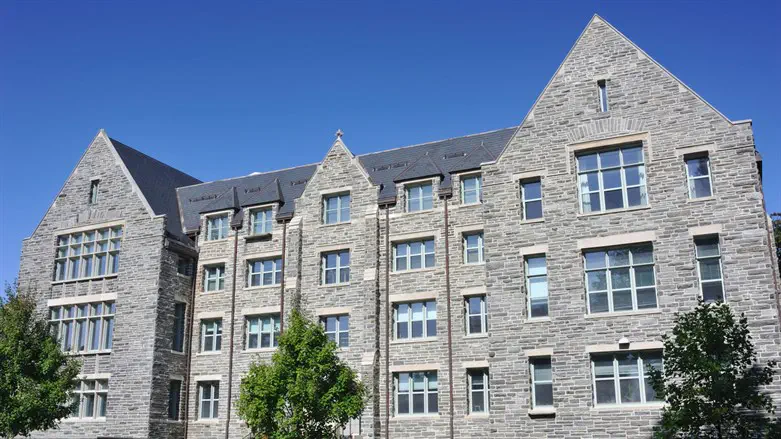
Tufts University has unveiled a plan to address campus antisemitism after an undergraduate survey validated the concerns of Jewish students.
“As you may know, toward the end of the last academic year in conjunction with the board of trustees, we embarked on an effort to understand how the rising tide of antisemitism in the United States and on college campuses was manifesting itself at Tufts,” Tufts President Tony Monaco wrote in a letter.
Several months ago, the Medford, Massachusetts college created a committee of senior leaders and board members, in collaboration with Hillel International, in order to “understand the complexities and consider paths forward.”
“This work was guided by our collective belief that antisemitism, discrimination, and harassment of any form should not be tolerated at Tufts and our commitment to ensure that all members of our community can express their religious and cultural identity free from fear, discrimination, or prejudice,” Monaco said.
After focusing on the undergraduate student body, they eventually sought the advice of over 40 focus groups containing over 100 faculty, staff, alumni, trustees, and students drawn from a diverse range of backgrounds.
Noting that the data collected from the survey on antisemitism was “both heartening and troubling” and that it “ validated concerns that we have been working to address,” Monaco said that overall most members of Tufts, including Jewish respondents, “feel that Tufts is a good place for Jewish students.”
Monaco pointed out that there is a “vigorous Jewish life on campus” that features a wide range of programming and events put together by Tufts Hillel, Tufts Chabad and various academic departments. He added that the school offers a broad curriculum on current and historical Jewish topics.
However, Monaco admitted that “despite this robust environment, more than half of Jewish student respondents reported to have observed some form of antisemitism at Tufts.”
“Disturbingly, we also heard from some Jewish students who felt that, in order to be welcome in student organizations supporting social justice, they had to hide their Jewish identities,” Monaco said. “Relatedly, some faculty and staff noted that the climate related to antisemitism, which often revolves around issues related to Israel-Palestine, has become more challenging in recent years. The line between political speech and antisemitic speech can be difficult to find and isn’t the same for everyone.”
Recent incidents of antisemitism at Tufts include a large swastika that was found painted on an athletic field shed in May and a mezuzah that was stolen from a Jewish student’s dorm room door in September.
The university is currently going over a list of recommendations in order to figure out the best manner to implement proposed changes.
Recommendations include: improved education and training for students, staff and faculty on antisemitism and antisemitic speech; orientation discrimination and bias awareness programs focusing on antisemitism; discussion forums on “understanding better the geopolitical situation in the Middle East”; improving the awareness of the Office of Equal Opportunity; and the creation of a campus advisory council to make recommendations to senior leaders on the best way to implement proposals.
“As a first step in response to these recommendations, the university has joined Hillel International’s Campus Climate Initiative (CCI),” Monaco said. “This will allow us to work with partners at Hillel International to assess our campus climate as it relates to antisemitism and to learn best practices from 18 other peer institutions and their leaders, who are also participating in this year’s CCI cohort, to develop action-oriented solutions to the recommendations that were identified for our own institution.”
Monaco added: “You have my commitment that we will work on these recommendations to improve the quality of Jewish life at Tufts and work to combat campus antisemitism in its various forms.”
